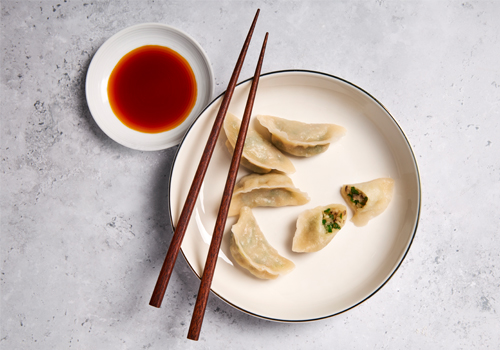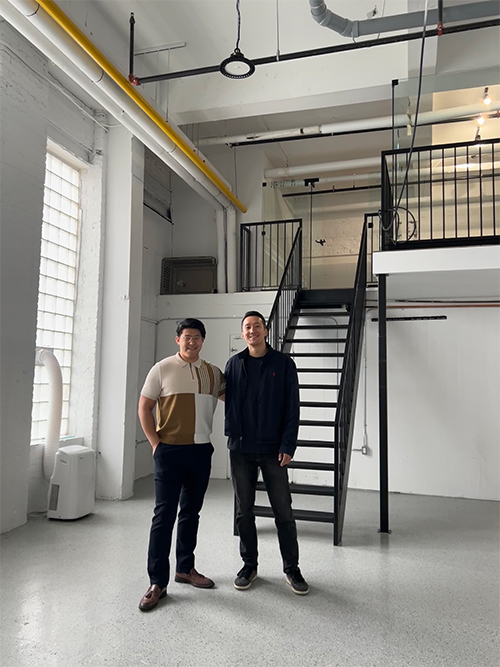A startup led by two Arts & Science alumni is exploring a new sustainability technology in the food sector.
Frank Yu and Charlie Hua have been friends since sitting beside each other at the back of an organic chemistry class. They’re now business partners forging a path through the often-fraught waters of a food innovation startup with their company, Myo Palate. Hua came up with the name after shortening myocyte — otherwise known as a muscle cell — down to “myo.”
Myo Palate got its start in 2022. Yu was in the midst of finishing his master’s degree in physiology at the Temerty Faculty of Medicine at the University of Toronto. Hua had just returned from a summer working in venture capital in San Francisco, where he noticed a surplus of alternative protein companies securing funding.

“That essentially prompted him to ask me, ‘Is the field of cultivated meats very hard?’” remembers Yu, who earned his honours bachelor of science in 2020 as a member of Innis College. “And naively, I said, ‘Can't be that hard. We just switch on a few genes. The cells will proliferate forever.’ Now being in the industry, obviously, it’s a lot more nuanced than a few genes being turned on.”
Cultivated meat is animal meat produced by cultivating cells, with no need for animal sacrifice. Yu compares the field of cultivated meat to the early days of solar energy. Both are deeply technical with high costs, at least at the beginning. As with early solar, cultivated meat funding is led by public rather than private capital because of the long timelines.
“It's a deeply vertical technology,” Yu says. “There're many hurdles that have to be overcome.”
Like solar, the potential sustainability impact of these products is substantial. Demand for meat is increasing globally. Instead of replacing traditional meat products, Myo Palate wants to help bridge the gap that can’t be fulfilled because of the environmental burden: the amount of land and water needed, and the CO2 traditional animal farming produces.
“It's going to be tougher for us, from a biotech perspective, to make whole cuts,” Yu says. “That's where the traditional animal farmers will kick in. If you want a more premium cut, go to a local farmer. If you want a daily burger, you can come to us because it's going to be cheaper.”
As Myo Palate gets rolling, external validators are taking notice. The past year was big for Yu, Hua and their team. They secured significant funding from the Canadian Food Innovation Network and Ontario Genomics, and they won the 2023 Temerty Innovation Prize for Student Entrepreneurship. The two were also recognized on Forbes’ 30 Under 30 Toronto for 2023.
“It has been great to receive this recognition and I think it speaks to how much we’ve been able to accomplish over the last two years,” says Hua, who earned his honours bachelor of arts in 2020 as a member of Woodsworth College.

“It was so surreal in the moment that I thought it was spam email from Forbes,” Yu says. “We couldn't have done it without the support of our community and all the people who've helped us get here. It takes a village.”
At Myo Palate, Yu leads the science side of the business, staying focused on their core strategic vision, while Hua oversees the operations side as CEO. Hua says the fact he and Yu come from such different educational backgrounds lets them always keep the science and commercial perspectives in tandem.
“I think this helps us make better decisions that are well-balanced — and thoroughly debated — and we’ve really benefitted from this dynamic,” Hua says.
“Our efforts combined are not additive but rather multiplicative in the sense that our strengths complement each other,” Yu says.
Yu’s expertise comes from a lifelong fascination with anatomy and medicine. It began when he was a high schooler in U of T’s Youth Summer Program living in New College, shadowing surgeons and absorbing as much information as possible.
“I volunteered for the remainder of my high school days, and it was actually one of the biggest reasons I decided to stay at U of T,” Yu says. “Nowhere else in the world offers something like this.”
Although Yu had a strong understanding of animal physiology when he began Myo Palate, cultivated meat is quite different. He quickly realized the biggest problem facing the technology is scalability.
Cultivated meat relies on using animal stem cells and differentiating them into a particular type of meat.
“The stem cells have these natural split points in terms of what they can become,” Yu says. “And we simply nudge the cells to go one way or the other.”
The trick then becomes mass proliferation of the cells until there’s enough to be consumed. Unfortunately, differentiated stem cells are typically not great at multiplying. The cells get “exhausted” during the process of growing and differentiating.
According to Yu, Myo Palate has found a way to achieve both mass differentiation and proliferation. He believes they can reach price parity with current products on the market in five to seven years.
“Eventually, as consumers warm up to this idea of purposefully creating meat without animal sacrifice or environmental burden, then we can start optimizing the price,” Yu says. “You need consumer buy-in for you to push for economies of scale and make cheaper and better products.”
Although there were many obstacles Yu and Hua had to overcome in the early stages of Myo Palate, things are beginning to settle into a comfortable rhythm. The team has just moved into its new lab space near Bathurst Street and Queen Street West.
“As we grow, we're looking for more and more bright minds to join us and contribute to the vision we have,” Yu says.

